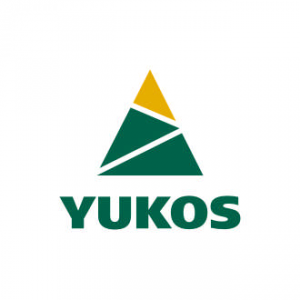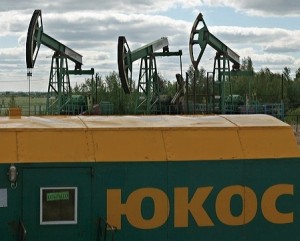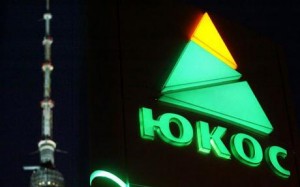Destruction of Yukos
 Like the campaign against Mikhail Khodorkovsky, the inextricably connected campaign against the Yukos Oil Company was a matter of political diktat, pursued with recklessness, malice and bad faith. The Yukos affair signalled the resolve of Kremlin insiders to suppress domestic dissent and to capture and exploit the gains of the privatised energy sector in Russia. Corrupt state officials achieved these objectives through widespread abuses of their control over the levers of state power, and succeeded in building new empires of wealth for themselves in the process. Consequences of the Yukos affair included the destruction of billions of dollars worth of property, a significant step backwards from competition in the energy sector and from market-oriented reforms, and a de-legitimisation of Russia’s legal system.
Like the campaign against Mikhail Khodorkovsky, the inextricably connected campaign against the Yukos Oil Company was a matter of political diktat, pursued with recklessness, malice and bad faith. The Yukos affair signalled the resolve of Kremlin insiders to suppress domestic dissent and to capture and exploit the gains of the privatised energy sector in Russia. Corrupt state officials achieved these objectives through widespread abuses of their control over the levers of state power, and succeeded in building new empires of wealth for themselves in the process. Consequences of the Yukos affair included the destruction of billions of dollars worth of property, a significant step backwards from competition in the energy sector and from market-oriented reforms, and a de-legitimisation of Russia’s legal system.
Use of Tax Claims to Attack Yukos
Yukos consistently paid its tax obligations in full, and even though it benefitted from lawful tax optimisation methods, the company was the largest private taxpayer in Russia (read more). From 1995 to 2004, Yukos audits had been approved by PricewaterhouseCoopers (PwC) (by 2007, after intense coercion and threats from the Russian authorities, PwC withdrew their stamp of approval from Yukos’s audits – see Financial Times and Wall Street Journal and this Q&A. In July 2003 even the Russian Tax Ministry had approved Yukos’s good standing, with only minor adjustments. Nevertheless, in December 2003, the Tax Ministry launched the first of what would become a series of extraordinary audits of Yukos’s tax payments.
The Tax Ministry justified additional taxes and fines by inventing entirely new legal concepts, which were applied only to Yukos, and misapplying Russian tax law, notably by retroactively assigning profits made by Yukos’s trading subsidiaries to the parent company at a higher tax rate.
Yukos’s back tax bill ended up exceeding $30 billion for 2000 to 2004. According to an analysis by the Parliamentary Assembly of the Council of Europe published in January 2005, “the total tax burden for Yukos, including the retroactive reassessments, is indeed about triple that of its Russian competitors” and “the total tax burden for 2002 exceeds [Yukos’s] turnover for that year.”
In April 2004, Yukos was given just two days to pay the reassessed outstanding tax for 2000. However, the tax authorities did not even bother to wait: they froze all company assets, making it impossible for Yukos to pay even if simultaneously challenging the legitimacy of the reassessment (for more information, see The Yukos Library).
Unlawful Expropriation
 The spurious back tax claims, asset freezing orders and absurdly unrealistic payment deadlines ultimately led to the seizure of Yukos’s crown jewel production asset, Yuganskneftegaz (YNG), in June 2004. In November 2004, the Russian authorities announced an auction of YNG would take place in December 2004. This contravened Russian law, which required sale of non-core assets before core assets for the settlement of tax claims. Yukos had proposed to the tax authorities that the company sell its recently acquired shares in Sibneft, which would have allowed it to pay off most of the tax liability without affecting its core operations, but the tax authorities ignored the proposal.
The spurious back tax claims, asset freezing orders and absurdly unrealistic payment deadlines ultimately led to the seizure of Yukos’s crown jewel production asset, Yuganskneftegaz (YNG), in June 2004. In November 2004, the Russian authorities announced an auction of YNG would take place in December 2004. This contravened Russian law, which required sale of non-core assets before core assets for the settlement of tax claims. Yukos had proposed to the tax authorities that the company sell its recently acquired shares in Sibneft, which would have allowed it to pay off most of the tax liability without affecting its core operations, but the tax authorities ignored the proposal.
At the time of its seizure, YNG was responsible for over 60% of Yukos’s total output. It had been valued by management at between $16.1 billion and $22.1 billion, and by Russian state-appointed evaluators Dresdner Kleinwort Wasserstein at between $14.7 billion and $17.3 billion. Nevertheless, prior to the auction, the Russian Ministry of Justice announced the value of YNG was no more than $10.4 billion.
Russian authorities justified this under-valuation by levelling new tax claims Yuganskneftegaz itself and by threatening its production licenses, all timed for Dresdner Kleinwort Wasserstein’s valuation. The authorities deducted the total additional liabilities from the lowest valuation mentioned by Dresdner Kleinwort Wasserstein.
In an effort to block the sale of YNG, Yukos filed for bankruptcy protection in December 2004, in the United States Bankruptcy Court for the Southern District of Texas. While events in Russia ultimately made this effort unsuccessful, the Texas court issued a temporary restraining order that barred the participation of Gazprom and a consortium of banks in the auction. According to the order, the “weight of the evidence supports a finding that it is substantially likely that the [tax] assessments [of Yukos] and manner of enforcement regarding taxes were not conducted in accordance with Russian law.” The court also found that the “evidence supports a finding of the likelihood that Plaintiff’s shares of YNG will be sold for approximately half the value estimated by two different investment bankers.”
Despite the court order, Gazprom attended the auction, although it did not submit a bid. The only other participant in the auction was a company called Baikal Finance Group, incorporated on December 6, 2004 (two weeks prior to the December 19, 2004 auction) with share capital of some $300 and a letterbox headquarters in a building that served as a liquor store in the city of Tver. President Putin at the time said Baikal Finance Group’s shareholders were “exclusively individuals”, stating: “These individuals have been in the energy business for many years…As far as I have been informed, they intend to build relations with Russia’s other energy companies interested in this asset.”
Somehow, Baikal Finance Group was able to secure the $1 billion deposit needed to participate in the auction and financing for the $9.8 billion bid it needed to purchase YNG, against an auction starting price of $8.65 billion.
Two weeks after Baikal Finance Group purchased YNG, state-controlled Rosneft purchased Baikal Finance Group, its only asset being the stake in YNG. Tax claims against Yugnaskneftegaz were soon dropped and threats to its production licenses disappeared.
In December 2004, chief Kremlin economic adviser Andrei Illarionov described the unlawful expropriation of YNG as the “scam of the year”. Illarionov eventually resigned in December 2005, stating that there was “no free economic space remaining anywhere in Russia” and that Russia qualified as “a politically unfree country”.
When asked in 2006, “Why does the state use non-transparent schemes….[such as] the use of Baikal Finance Group to buy YNG?”, President Putin responded by claiming that the use of Baikal Finance Group to purchase YNG was necessary to protect the ultimate owner of the asset from legal claims of expropriation.
The Forced Bankruptcy of Yukos
 Due to the freezing order on Yukos’s assets, the company defaulted on repayment of loans of $1.6 billion and $1 billion from a consortium led by Société Générale. Rosneft, in a confidential agreement with the consortium, agreed to purchase Yukos’s debts in exchange for the consortium instigating bankruptcy proceedings, which it did in March 2006. The Russian government became the main creditor of Yukos.
Due to the freezing order on Yukos’s assets, the company defaulted on repayment of loans of $1.6 billion and $1 billion from a consortium led by Société Générale. Rosneft, in a confidential agreement with the consortium, agreed to purchase Yukos’s debts in exchange for the consortium instigating bankruptcy proceedings, which it did in March 2006. The Russian government became the main creditor of Yukos.
Following the appointment of a bankruptcy receiver, a creditors’ meeting was called for June 2006. At the meeting a restructuring plan was presented by Yukos that would have allowed the company to settle its liabilities and continue operating in light of rising oil prices. The plan was rejected, as the Russian authorities once again demonstrated that they were not interested in settling with Yukos. In August 2006, a Russian court declared Yukos insolvent.
The rejection of Yukos’s restructuring plan forced a fire sale of the company’s remaining assets, which included the production facilities Tomskneftegaz (including the Angarsk and Achinsk refineries) and Samaraneftegaz (with a further three refineries). The majority of assets were acquired at well below market value by Rosneft.
Rosneft included its stake in YNG in its IPO for floatation on the London Stock Exchange in July 2006. As stated by the Financial Times, the state-controlled company’s sweep of all of Yukos’s production units and refineries transformed the company from Russia’s number eight oil major, worth just $6 billion, into the country’s biggest producer, with a market capitalisation of $90 billion, spending a mere net $2 billion in the process (read more). The purchase of YNG was described at the time by Rosneft as “the most monumental bargain in Russia’s modern history.”
Yukos shareholders again received no benefit from the auctions throughout 2006 and 2007 as all Yukos liabilities were manufactured to match almost exactly the fire sale prices of all Yukos assets, leaving no balance to be distributed to the shareholders. American investors in particular lost nearly $7 billion.
In November 2007 Yukos’s liquidation was complete and the company was removed from the Russian register of enterprises.
The illegal expropriation of Yukos is now the subject of numerous legal proceedings around the world. For more information, see Yukos-Related Cases and The Yukos Library.
